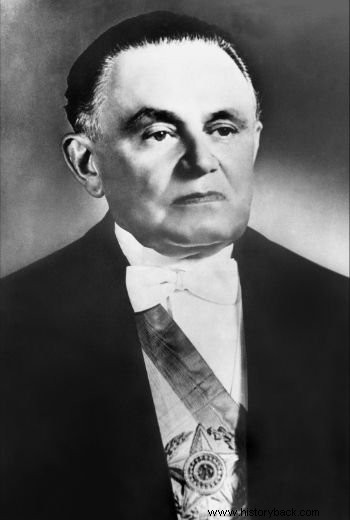Humberto de Alencar Castello Branco was the twenty-sixth president of the Republic of Brazil . He governed the country between April 15, 1964 and March 15, 1967. Elected with 361 votes, the marshal commanded Brazil during one of the most critical periods in history, the military dictatorship.
Castello Branco was one of the organizers of the 1964 Military Coup. During his government, Brazil broke diplomatic relations with Cuba, creating the SNI (National Information Service) , the BNH (National Housing Bank), created the FGTS (Fundo de Garantia do Tempo de Serviço) and the country started trading with a new currency, Cruzeiro Novo.
In power, Marshal Castello Branco signed the Press Law, which limited the activities of the communications sector, and the National Security Law, which defined crimes against the actions of the military government.
Biography of President Castello Branco
Marshal Castello Branco, who assumed the presidency when he was 64 years old, was born in Fortaleza (CE) on September 20, 1897. As a way of guaranteeing a place at the Colégio Militar de Porto Alegre, the future president had his date of birth changed.
 Marechal Castello Branco died in a plane crash
Marechal Castello Branco died in a plane crash
He also attended the Escola Militar de Realengo, the School for the Improvement of Naval Officers, the Aviation School, and the Army General Staff course. He was in the United States in 1943, during the period of preparation of the Brazilian Pracinhas in World War II.
He took part in combat in Italy and reached the command of the FEB (Brazilian Expeditionary Force) in 1945. He was elevated to the rank of general in 1962 and Chief of Staff of the Army between 1963 and 1964.
He was one of the main organizers of the 1964 Military Coup, which removed President João Goulart (1918-1976) from power, who were elected by the people. He was conducted through indirect election to the post of president on April 15 of the same year.
Marshal Castello Branco was the victim of a plane crash and died on July 18, 1967.
Government Castello Branco
The apparatus that guaranteed political repression during the military dictatorship in Brazil was created during the government of Marshal Castello Branco. The administration interfered in the unions, students and there were a large number of arrests of those who disagreed with the government.
The persecution drove politicians, artists, activists and students into exile. Castello Branco broke diplomatic relations with Cuba, which demonstrated the political orientation of repression of communism.
At the same time, there was a rapprochement with the United States which, curiously, never went through a military dictatorship and preaches freedom among its precepts and citizens' rights.
In this government, the SNI (National Information Service) was created, responsible for keeping the government abreast of the political activities of the citizens. Marshal Castello Branco approved the measures that excluded popular participation from the choice of rulers in the main spheres of power.
Political parties were extinguished and only two were allowed to function, Arena (National Renovation Alliance) and MDB (Brazilian Democratic Movement). The measures would only be revoked in the government of another military man, General João Baptista Figueiredo.
Also read:Economic Miracle.
